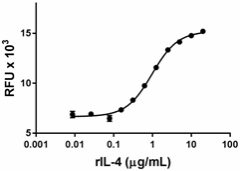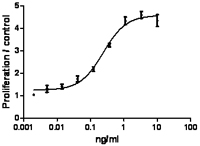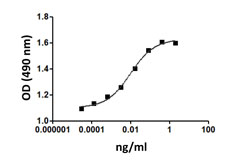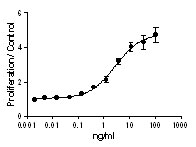- Regulatory Status
- RUO
- Other Names
- B cell growth factor 1 (BCGF-1), B-cell stimulatory factor 1 (BSF-1), interleukin-4, lymphocyte stimulatory factor 1
- Ave. Rating
- Submit a Review
- Product Citations
- publications

-

Recombinant rat IL-4 induces the proliferation of TF 1 human erythroleukemic cells in a dose dependent manner. The ED50 for this effect is 0.3 – 1.5 µg/mL. -

Stability testing for recombinant rat IL-4. Recombinant rat IL-4 was aliquoted in PBS, pH 7.2 at 0.2 mg/mL and one aliquot was kept at 4°C (control), and another was frozen and thawed four times (4x Freeze/thaws). After this procedure, the samples were tested for their ability to induce TF-1 cell proliferation. -

Recombinant rat IL-4 induces the proliferation of TF 1 human erythroleukemic cells in a dose dependent manner. BioLegend’s protein was compared side-by-side to a competitor’s equivalent product.
IL-4 is the primary cytokine implicated in the development of Th2-mediated responses, which is associated with allergy and asthma. The Type I receptor comprises IL-4Rα and the common gamma-chain (γc), which is also shared by the cytokines IL-2, -7, -9, -15 and -21 and is present in hematopoietic cells. IL-4 can use the type II complex, comprising IL-4Rα and IL-13Rα1, which is present in non-hematopoietic cells. This second receptor complex is a functional receptor for IL-13, which shares approximately 25% homology with IL-4. The type I receptor complex can be formed only by IL-4 and is active in Th2 development. In contrast, the type II receptor complex formed by either IL-4 or IL-13 is more active during airway hypersensitivity and mucus secretion and is not found in T cells.
Product DetailsProduct Details
- Source
- Rat IL-4 amino acids (Ile22 – Ser147) (Accession # P20096) was expressed in 293E. The amino terminal contain 8His-3GSIEGR- tag.
- Molecular Mass
- The 142 amino acid recombinant protein has a predicted molecular mass of approximately 15.8 kD. The protein migrates approximately at 23 kD in DTT-reducing and non-reducing conditions by SDS-PAGE. The predicted N-terminal amino acid is His.
- Purity
- > 98% by SDS-PAGE gel and HPLC analyses.
- Formulation
- 0.22 µm filtered protein solution is in PBS pH 7.2.
- Concentration
- 10 and 25 µg sizes are bottled at 200 µg/mL. 100 µg size and larger sizes are lot-specific and bottled at the concentration indicated on the vial. To obtain lot-specific concentration and expiration, please enter the lot number in our Certificate of Analysis online tool.
- Storage & Handling
- Unopened vial can be stored between 2°C and 8°C for up to 2 weeks, at -20°C for up to six months, or at -70°C or colder until the expiration date. For maximum results, quick spin vial prior to opening. The protein can be aliquoted and stored at -20°C or colder. Stock solutions can also be prepared at 50 - 100 µg/mL in appropriate sterile buffer, carrier protein such as 0.2 - 1% BSA or HSA can be added when preparing the stock solution. Aliquots can be stored between 2°C and 8°C for up to one week and stored at -20°C or colder for up to 3 months. Avoid repeated freeze/thaw cycles.
- Activity
- Rat IL-4 induces the proliferation of TF-1 human erythroleukemic cells in a dose dependent manner. The ED50 is 0.3 - 1.5 µg/mL.
- Application
-
Bioassay
- Application Notes
-
BioLegend carrier-free recombinant proteins provided in liquid format are shipped on blue ice. Our comparison testing data indicates that when handled and stored as recommended, the liquid format has equal or better stability and shelf-life compared to commercially available lyophilized proteins after reconstitution. Our liquid proteins are verified in-house to maintain activity after shipping on blue ice and are backed by our 100% satisfaction guarantee. If you have any concerns, contact us at tech@biolegend.com.
- Product Citations
-
Antigen Details
- Structure
- Heterodimer
- Distribution
-
IL-4 is produced by Th2 cells, naive CD4+ T cells, NKT cells, and basophils.
- Interaction
- T cells, B cells, macrophages, epithelial cells, smooth muscle cells, and bronchial fibroblasts.
- Ligand/Receptor
- IL-4 signals through Type I (IL-4Rα, γc) and Type II receptors (IL-4Rα, IL-13Rα1) complexes.
- Bioactivity
- IL-4 has a crucial role in the differentiation of TH2 cells and induction of Th2 associated cytokines. IL-4, through its activation of STAT6, upregulates GATA3 expression and also suppresses TH1 and TH17 cell responses, partly through the upregulation of
- Cell Type
- B cells, Hematopoietic stem and progenitors, Embryonic Stem Cells
- Biology Area
- Cell Biology, Immunology, Stem Cells
- Molecular Family
- Cytokines/Chemokines
- Antigen References
-
- Richter G, et al. 1990. Cytokine 2:221.
- Hsieh CS, et al. 1992. Proc. Natl. Acad. Sci. USA. 89:6065.
- Andrews AL, et al. 2006. J. Immunol. 176:7456.
- Kato A, et al. 2007. J. Immunol. 179:1080.
- LaPorte SL, et al. 2008. Cell. 132:259.
- Martinez FO, et al. 2009. Annu. Rev. Immunol. 27:451.
- Gene ID
- 287287 View all products for this Gene ID
- Specificity (DOES NOT SHOW ON TDS):
- IL-4
- Specificity Alt (DOES NOT SHOW ON TDS):
- IL-4
- App Abbreviation (DOES NOT SHOW ON TDS):
- BA
- UniProt
- View information about IL-4 on UniProt.org
Related FAQs
- Why choose BioLegend recombinant proteins?
-
• Each lot of product is quality-tested for bioactivity as indicated on the data sheet.
• Greater than 95% Purity or higher, tested on every lot of product.
• 100% Satisfaction Guarantee for quality performance, stability, and consistency.
• Ready-to-use liquid format saves time and reduces challenges associated with reconstitution.
• Bulk and customization available. Contact us.
• Learn more about our Recombinant Proteins. - How does the activity of your recombinant proteins compare to competitors?
-
We quality control each and every lot of recombinant protein. Not only do we check its bioactivity, but we also compare it against other commercially available recombinant proteins. We make sure each recombinant protein’s activity is at least as good as or better than the competition’s. In order to provide you with the best possible product, we ensure that our testing process is rigorous and thorough. If you’re curious and eager to make the switch to BioLegend recombinants, contact your sales representative today!
- What is the specific activity or ED50 of my recombinant protein?
-
The specific activity range of the protein is indicated on the product datasheets. Because the exact activity values on a per unit basis can largely fluctuate depending on a number of factors, including the nature of the assay, cell density, age of cells/passage number, culture media used, and end user technique, the specific activity is best defined as a range and we guarantee the specific activity of all our lots will be within the range indicated on the datasheet. Please note this only applies to recombinants labeled for use in bioassays. ELISA standard recombinant proteins are not recommended for bioassay usage as they are not tested for these applications.
- Have your recombinants been tested for stability?
-
Our testing shows that the recombinant proteins are able to withstand room temperature for a week without losing activity. In addition the recombinant proteins were also found to withstand four cycles of freeze and thaw without losing activity.
- Does specific activity of a recombinant protein vary between lots?
-
Specific activity will vary for each lot and for the type of experiment that is done to validate it, but all passed lots will have activity within the established ED50 range for the product and we guarantee that our products will have lot-to-lot consistency. Please conduct an experiment-specific validation to find the optimal ED50 for your system.
- How do you convert activity as an ED50 in ng/ml to a specific activity in Units/mg?
-
Use formula Specific activity (Units/mg) = 10^6/ ED50 (ng/mL)












Follow Us